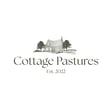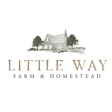
Do Dairy Cows Need Grain? Dairy Cows and More with Shawn and Beth Dougherty
This episode features Shawn and Beth Dougherty. You might have heard our prior episode with the Doughertys discussing low-input farming, but this episode focuses much more on dairy cows. One of my favorite questions that came up was whether or not a dairy cow must be fed grain - this questions and more are covered throughout the episode and we hope you find the discussion inspring and of value to you, wherever you are in your homesteading journey.
To learn more about Little Way Farm and Homestead, including the farm or for other Podcast episodes - please check out littlewayhomestead.com, or email us at hello@littlewayhomestead.com.
___
Shawn and Beth Dougherty have been farming together since the 1980's
Using intensive grazing as the primary source of food energy, the Doughertys raise dairy and beef cows, sheep, farm-fed hogs, and a variety of poultry, producing most of the food, and feed, on the farm. Their ongoing project is to identify and test the potential for operating a farm and homestead with minimal off-farm inputs.
They are the authors of The Independent Farmstead, actively contribute to Plain Value magazine, have written for Mother Earth News, Hobby Farms and more. They have been featured in various interviews, podcasts, and conferences
Shawn and Beth promote an outline of farming and homesteading that is inspiring to us as we consider the ways we engage in a stewardship model which considers homesteading, farming and the Catholic Faith.
We are excited to bring you this interview as a production of Little Way Farm and Homestead. If you are interested in helping this podcast grow and reach a larger audience, please consider leaving a review wherever you are listening to the episode, and share with someone you know!
Helpful Links:
The Independent Farmstead by Shawn and Beth Dougherty https://www.chelseagreen.com/product/the-independent-farmstead/
The One Cow Revolution Website https://one-cow-revolution.com/
For more information about Little Way Farm and Homestead including the farm, podcast, and upcoming events, check out https://littlewayhomestead.com/.
For media inquiries, advertising, speaking request, guest referrals, consulting and more - email us at hello@littlewayhomestead.com.

